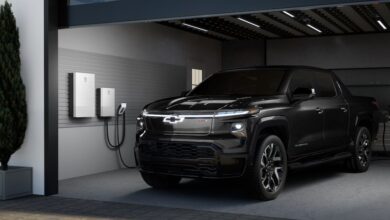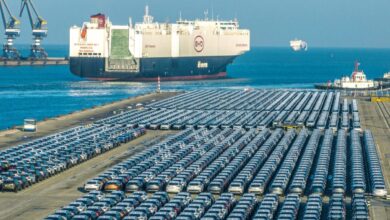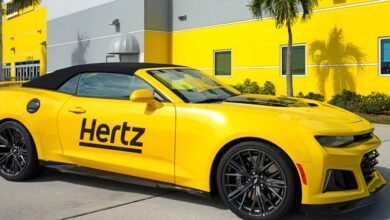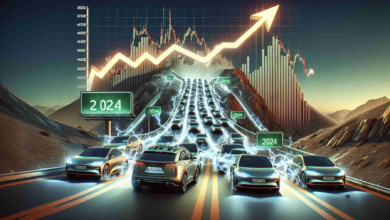US ups the ante on Chinese EV imports
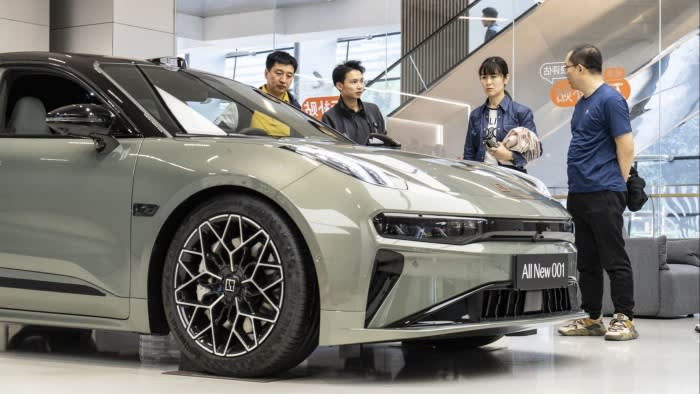
Today’s top stories
-
Russian President Vladimir Putin replaced his security chiefs in a surprise reshuffle. His forces captured three more villages in Ukraine’s north-eastern Kharkiv region, as they press ahead with a new offensive intended to draw Ukrainian forces away from front lines in the east.
-
Israeli troops are engaged in close-quarters combat with resurgent Hamas fighters in north Gaza, an area they previously claimed to have largely cleared of the Palestinian militant group.
-
Anglo American has rejected a revised takeover proposal from rival BHP that values it at £34bn, setting the stage for a potential hostile takeover battle between two titans of the global mining industry.
For up-to-the-minute news updates, visit our live blog
Good evening.
The US is set to impose 100 per cent tariffs on imports of electric vehicles from China, the latest move by President Joe Biden to protect American industry from cheap competition and win over trade union members just six months ahead of a general election.
The move, set to be announced tomorrow, comes alongside the results of a review of the tariffs his predecessor Donald Trump slapped on Chinese imports in 2018, kicking off a trade war. The administration is also expected to announce other tariffs on clean energy imports on concerns that China is moving ahead unfairly in the sectors crucial to the green transition.
However, as Alan Beattie points out in today’s Trade Secrets newsletter (for Premium subscribers), the announcement could be seen as largely symbolic, especially for the US EV market, where Chinese goods are already kept out by a combination of 27.5 per cent tariffs, plus exclusion from the Inflation Reduction Act’s set of EV tax breaks for consumers. The real point to watch, says Beattie, is whether Chinese companies will be able to sneak autos into the US market via Mexico.
Talk of floods of cheap EV imports is just as pressing across the Atlantic, where the EU, notes Beattie, faces a dilemma. In choosing whether to move against state-subsidised Chinese EV factories in Europe, does it want to green its economy more than it wants EVs to be built by European-owned manufacturers?
Brussels is widely expected to raise tariffs in the coming months, even if some domestic producers such as VW are wary, arguing the move risks retaliation against international brands in China. Chinese brands are certainly upping the ante: BYD last week said it aimed to replace Tesla as Europe’s top EV seller by 2030. The broader question of Chinese competition meanwhile is becoming a “defining challenge” for EU companies.
The debates around tariffs come amid slowing demand for EVs with problems including still high interest rates and inadequate charging infrastructure, leaving global carmakers investing in the hybrid technologies that had until recently merely been seen as stop gaps. Industry giants are not immune: Tesla boss Elon Musk recently shut down the group’s entire supercharger division, laying off hundreds of staff as revenues dipped.
Carmakers are also concerned that governments might soften previous plans to force a rapid transition away from internal combustion engines. Mass take-up might be slowed further by a slew of new taxes from global policymakers as they attempt to fill a $110bn hole in government revenues from the drop in receipts from fuel duties.
Need to know: UK and Europe economy
Three people were charged by the UK with spying offences, accused of assisting the Hong Kong intelligence service and of “foreign interference”. The charges are the second time the National Security Act, which widened the scope of what counts as spying, has been used since it was introduced last year.
Chronic economic underperformance is worrying EU policymakers who fear a growing gap with the US. A new Big Read looks at potential solutions.
EU development chief Jutta Urpilainen said the bloc was struggling to counter China’s growing influence in the global south as Beijing proves more agile in providing infrastructure investment in contrast to Brussels bureaucracy and conditions attached to development finance.
More than a decade of separatist turbulence in Spain’s Catalan region could be over after a clear win from Prime Minister Pedro Sánchez’s Socialists in regional elections.
Need to know: global economy
While the US and China are at loggerheads over electric vehicles, they at least appear to be working in tandem on artificial intelligence. Talks begin tomorrow in Geneva to head off the danger of “unintended conflict” caused by AI.
US President Joe Biden’s re-election prospects meanwhile continue to be dogged by consumers’ fears over inflation, with 80 per cent of voters saying high prices are one of their biggest financial challenges, according to the latest FT-Michigan Ross poll.
Chinese authorities kicked off plans to sell Rmb1tn ($140bn) of long-dated bonds, as Beijing increases spending to kick start the economy.
They also plan to turn the tropical island province of Hainan into the world’s largest duty-free shopping zone and persuade shoppers to buy their luxury goods in the country rather than in rival destinations such as South Korea’s Jeju Island.
In the UK in 1965, the most common age of death was the first year of life: today it is 76 for women and 71 for men. Chief economics commentator Martin Wolf says increased longevity around the world, humanity’s greatest achievement, will bring about profound social change.
Strikes at Brazil’s environmental enforcement agencies are starting to hit Latin America’s largest economy, with thousands of cars stuck in ports and dozens of power projects caught in limbo. Some 4,000 public servants have halted work since the start of the year in protest over low wages and poor conditions.
Colombian leftist leader and former guerrilla Gustavo Petro has plans to rewrite the country’s constitution with “people’s assemblies” to implement significant reforms.
Need to know: Business
JPMorgan Chase, Mizuho and Bank of America were named as the biggest fossil fuel industry financers in a report by climate campaigners which calculates the world’s biggest banks have put $6.9tn into the sector in the eight years since the Paris climate accord. The world’s 60 largest lenders put in around $705bn in 2023 alone.
The EU is set to slap Microsoft with new antitrust charges over its Teams software in its latest foray against Big Tech. The company has already said it would unbundle Teams from other packages such as Office, not just in Europe, but across the world.
UK newspaper groups warned Apple that its “web eraser” tool to block advertisements, set for release in the next iOS 18 software update, would put the financial sustainability of journalism at risk.
Elon Musk launched a global fight against what he called government “censorship” of his X social media platform after authorities demanded the removal of content on the site they deem as illegal or harmful. He did however win an Australian legal battle over the banning of a church stabbing video.
US shale companies were accused of collusion over oil prices in a wave of class action lawsuits, following similar complaints from antitrust regulators.
Some investors might think corporate climate targets impede performance, but FT research says that isn’t necessarily so, writes Matthew Vincent.
The World of Work
In decades past, the company car was a symbol of professional status, prized by employees as a marker of seniority. It is now making a comeback in the guise of electric vehicles leased through salary sacrifice schemes. The perk has quietly become the biggest driver of electric vehicle sales across the UK.
Not enough employers recognise domestic violence as a workplace issue, writes columnist Pilita Clark. That is a shame considering how much companies can do to help people leave abusive relationships, she argues.
Do you want to leave but are too scared to quit your job? If you’re in Japan, an agency can do it for you, writes Asia business editor Leo Lewis.
If you do work in Japan, or anywhere in Asia Pacific in fact, we’d love to hear from you for our brand new ranking of the region’s best employers.
Some good news
New rules from the International Maritime Organization on marine fuels led to a dramatic fall in sulphur dioxide emissions from shipping, helping mitigate local air pollution and acid rain.
Thanks for reading Disrupted Times. If this newsletter has been forwarded to you, please sign up here to receive future issues. And please share your feedback with us at disruptedtimes@ft.com. Thank you
